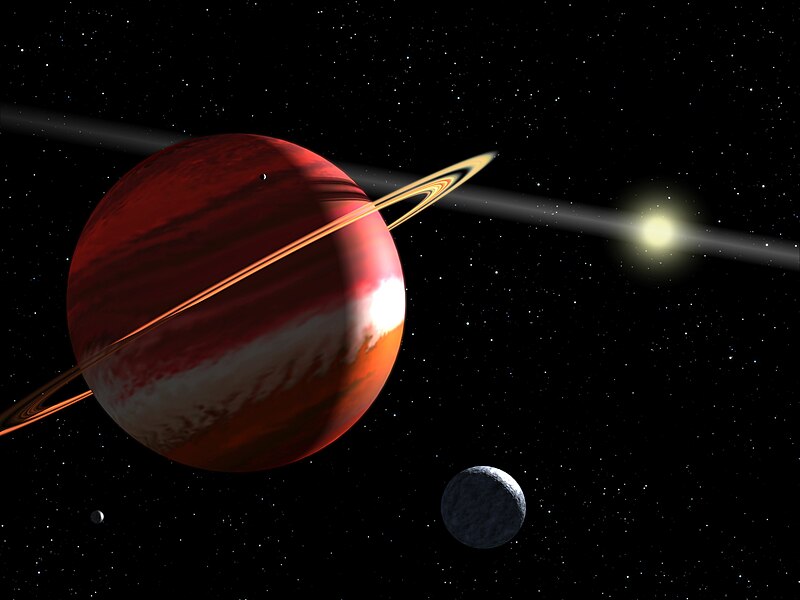Project Icarus is a 5 year study, headed by scientists from the Tau Zero Foundation, a non-profit group of scientists dedicated to interstellar spaceflight. The ambition of the project is designing a spacecraft and a plan for a future space mission to another planetary system.
At the moment no technology exists that would allow such a journey in a reasonable timeframe. Icarus works with the assumption that we will one day possess technology that allows us to send probes to other stars, reaching the star within 100 years after launch. Given realistic propulsion options, and the requirement that the spacecraft can slow down to orbit its target, the target star cannot be more than 15 light-years from Earth, although given that the timeframe is 100 years, the distance will likely be much less.
 |
| The second stage of the Project Daedalus interstellar spacecraft arrives at its target star system. (Credit: Adrian Mann) |
One of the factors will of course be which stars in a 15 lightyear radius will have planets. Of the 38 stellar systems (some containing more than one star) only 2 are known to have planets so far. Epsilon Eridani, 10.5 light-years away, and the red dwarf GJ 674 at a distance of 14.8 light-years.
Just outside the radius there are another 3 stars with planetary systems.
There has however to date not been a systematic survey for planets of the closest stars, which in the near future could reveal a lot more planets, by current estimates around 15 or 16.
 |
| Artists Impression of the planet Epsilon Eridani b (Credit: NASA, ESA) |
Thus, although currently we cannot identify an obvious specific target for Icarus, when the time comes to actually build a starship, we will have a very good idea where to send it.
My bests bet lies with the nearest system. Even though no planets have been found there yet, due to the system being the closest to the solar system at 4.4 lightyears, it will likely be chosen as a target for the first human spacecraft to fly under the light of another star.
I'm reminded of Danny Boyle's Sunshine...
ReplyDeleteI wonder if they will consider hibernation as a possible solution for long space travel. Provided the AI on board doesn't kill everyone.
ReplyDeleteSee I'm not sure whether I could go into space on an exploration mission knowing I might never return. It would be beyond mind-blowing up there and has even sent some astronauts mad, what a way to go if you had the choice between death by old age or this
ReplyDeleteI think we'll not be alive when journeys like that will be possible.
ReplyDeleteHi guys.
ReplyDeleteNote that Icarus is an *unmanned* probe. :-)
PatG (Icarus designer)
That would be incredible, good post.
ReplyDeleteU Laugh U Lose
http://ulaughulose.blogspot.com/
unmanned...still cool though.
ReplyDeletein 100 yrs technology wiil be more advanced and probes will already be there before it gets there. mind=blown
ReplyDeleteWish I could travel to another solar system.
ReplyDeleteOh someone from the project, awesome. And thank you for the clarification. I should have said that more clearly in the original post I guess :)
ReplyDeletevery interesting stuff, thanks for the info!
ReplyDeleteIcarus just makes me think of the movie Sunshine :P
ReplyDeleteIt's kind of crazy that you might work on a project and never see it completed until your great grandkids are old enough to help.
ReplyDeleteThat's an amazing goal to have, very future-oriented
ReplyDeletenice pictures of the cosmos..i love looking at other planets
ReplyDeletehttp://skybluetrading.blogspot.com/
I think you would find plenty of volunteers for a one way trip...
ReplyDeleteThat would be amazing, thanks for an interesting article.
ReplyDeleteVery interesting post. I always liked to find out more about space
ReplyDeleteLooks like a scene from Eve Online!
ReplyDeleteWow! Super interesting post, keep it up! :D Following and supporting!
ReplyDeleteThings on this scale never cease to amaze me. I suppose things can only get more advanced in the future, but just how far can the possibilities be stretched?
ReplyDeleteI love reading about things like this. I hope in my lifetime we'll be able to make great advances like this.
ReplyDeleteI'd love to hear more about this
ReplyDeleteI'm a huge fan of astronomy, following :)
ReplyDeletethose 100 years are nothing to the truly astronomical timeframes stuff takes to happen. When I read about the future of the universe, even though my lifespan is practically nothing against those aeons, I felt deeply sad about its fate, and what it would be like to experience life in billions of billions of billions of years ... All the more reason to enjoy your life while it lasts.
ReplyDeletewe need to work on how to fold space so we can travel farther faster.
ReplyDeleteYour blog is amazing man, really. Thanks for all the interesting posts.
ReplyDeleteWe eventually have to transfer to a different solar system when our sun dies.
ReplyDeleteAs always some really cool stuff here. I have no doubt we will be sending unmanned probes to other stars but i doubt anything of interest will come out of it in our life times.
ReplyDeletenice post, i love astronomy
ReplyDeleteAlthough it's an unmanned probe, it still sounds pretty darn cool.
ReplyDelete